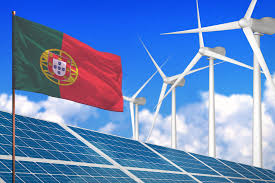Portugal to raise share of renewables in energy consumption to 51% by 2030

Lisbon: Portugal plans to increase the weight of renewables to 51% of its final energy needs by 2030 from a current target of 47% as part of its goal to become carbon neutral by 2045, the government said on Wednesday.
The new target is part of an updated draft of the energy and climate goals that Portugal’s new government is finalising, which will shortly be discussed in parliament before being sent to Brussels.
Environment and Energy Minister Maria da Graca Carvalho told a parliamentary committee that raising the target “is a substantial evolution” and “will be fundamental in guiding our decarbonisation trajectory in all sectors”.
The weight of renewable energy in final energy consumption in Portugal was 34.7% in 2022, placing Portugal sixth among the 27 EU member states, according to official data.
Final energy consumption is the total energy consumed by households, industry and agriculture, excluding that which is used by the energy sector itself.
The revised draft will maintain Portugal’s commitment to carry out its first offshore wind auction of up to 2 gigawatts (GW) of capacity, though it will cut a target of having 5.5 GW of new electrolyser capacity for green hydrogen production in 2030.
Carvalho said the licensing process for renewables investments will be streamlined to give promoters one point of contact with the government, rather than having to liaise with as many as 14 official entities before getting final approval.
Promoters have said the slowness of licensing was leading to project delays.
Portugal aims to generate 85% of its annual electricity production from renewable sources by 2030, compared to 61% in 2023, one of the highest ratios in Europe.





